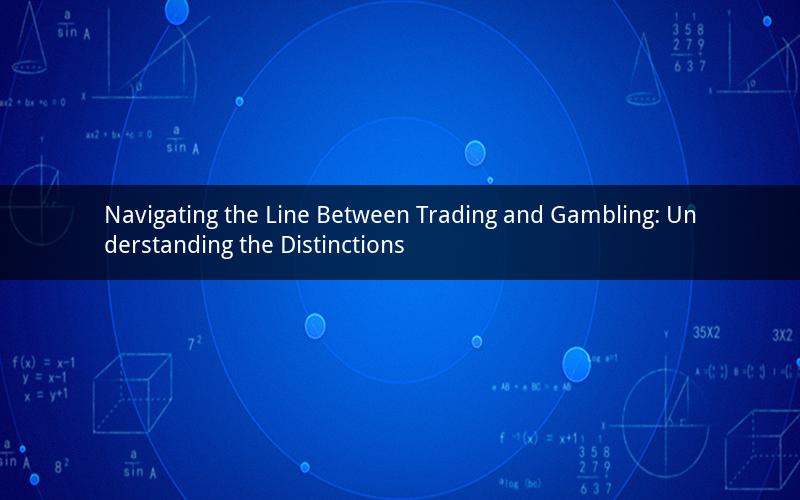
Trading and gambling, often perceived as synonymous, are distinct activities that involve different objectives, methodologies, and risk assessments. While they may share certain elements, the core principles that govern each differ significantly. This article explores the nuances that separate trading and gambling, providing insights into their unique characteristics.
Trading: The Art of Financial Management
Trading, whether it pertains to stocks, currencies, commodities, or digital assets, is an intricate process that requires extensive knowledge, skill, and discipline. Its primary objective is to generate profit through the analysis of market trends, fundamental factors, and technical indicators. Here are some key aspects of trading:
1. Market Analysis: Traders meticulously study market data to identify patterns, trends, and potential opportunities for profit.
2. Risk Management: Trading involves managing risks effectively by diversifying portfolios, setting stop-loss orders, and understanding leverage.
3. Long-Term Goals: Traders typically aim for sustainable, long-term gains rather than quick, short-term profits.
4. Emotional Control: Maintaining composure and avoiding emotional decisions is crucial in trading.
5. Continuous Learning: Success in trading requires constant learning and adaptation to changing market conditions.
Gambling: The Game of Chance
Gambling, on the other hand, is a form of entertainment that involves risking money on an event with an uncertain outcome. It is characterized by its reliance on luck and the absence of a structured strategy. Here are some defining features of gambling:
1. Randomness: The outcome of a gambling event is determined by chance, making it unpredictable.
2. Short-Term Goals: Gamblers often seek quick, short-term wins without considering long-term consequences.
3. Emotional Motivation: Gambling can be driven by the thrill of winning, leading to impulsive decisions.
4. Addiction: The allure of potential gains can lead to addictive behavior, as gamblers chase losses or try to recover previous winnings.
5. Legal and Ethical Considerations:Gambling may be illegal or unethical in certain contexts, depending on the activity and jurisdiction.
Key Differences Between Trading and Gambling
Despite their similarities, trading and gambling differ in several critical aspects:
1. Objective: Trading focuses on generating long-term profit through informed decision-making, while gambling seeks short-term gains based on chance.
2. Methodology: Traders employ various analytical tools and strategies, whereas gamblers rely on luck and intuition.
3. Risk Assessment: Trading involves careful risk management, while gambling is characterized by high risk and potential financial loss.
4. Skill vs. Chance: Trading requires skill, knowledge, and discipline, whereas gambling relies on chance and luck.
5. Legal and Ethical Considerations: Some forms of gambling are illegal or unethical, while trading is generally legal and acceptable within certain boundaries.
Common Misconceptions
Despite the clear distinctions between trading and gambling, there are several misconceptions that often混淆 the two:
1. Both Involve Risk: While both activities involve risk, the nature of the risk differs significantly. Trading risk can be managed through strategies and tools, while gambling risk is inherently unpredictable.
2. Trading is Risk-Free: Trading, like any investment, carries risks. It is essential to understand the market and implement proper risk management strategies.
3. Gambling is a Viable Career: Although some individuals have achieved success through gambling, it is not a reliable or sustainable source of income compared to trading.
4. Both Require Similar Skills: Trading and gambling require different skill sets. Trading involves analytical and strategic thinking, while gambling relies on luck and intuition.
5. Trading is Unethical: Trading, when conducted legally and ethically, is a legitimate and valuable activity. It contributes to economic growth and development.
Conclusion
In conclusion, while trading and gambling share certain elements, they are fundamentally different activities. Trading is an art of financial management that requires skill, discipline, and a long-term perspective, while gambling is a form of entertainment driven by chance and short-term gains. Understanding the distinctions between these two activities is crucial for anyone looking to engage in either pursuit. By recognizing the unique characteristics of each, individuals can make informed decisions and minimize potential risks.
Questions and Answers
1. Question: Can a person be successful in trading and gambling simultaneously?
Answer: While it is possible for an individual to excel in both trading and gambling, it is not advisable. The contrasting objectives and methodologies of these activities can lead to conflicting strategies and potential financial loss.
2. Question: Are there any ethical concerns associated with trading?
Answer: Trading, when conducted legally and ethically, is not inherently unethical. However, there may be ethical concerns associated with certain trading practices, such as insider trading or manipulating markets.
3. Question: Can trading be considered a form of gambling?
Answer: No, trading is not considered a form of gambling. It involves a structured approach, risk management strategies, and a long-term perspective, whereas gambling relies on luck and chance.
4. Question: What are the benefits of trading over gambling?
Answer: The benefits of trading over gambling include the potential for long-term profitability, risk management strategies, and the opportunity to develop skills and knowledge in financial markets.
5. Question: Can a person become addicted to trading or gambling?
Answer: Yes, both trading and gambling can lead to addiction. The allure of potential gains, coupled with the thrill of the activity, can make it difficult for individuals to control their behavior and stop engaging in these activities.